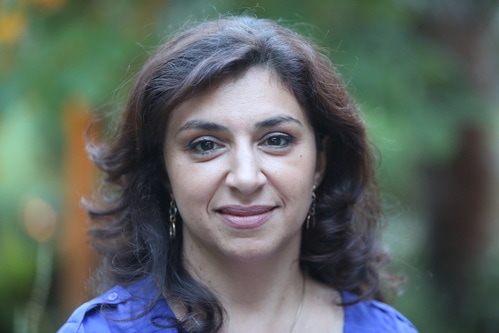REDMOND, WA— Born to a Palestinian father and Syrian Jordanian mother in Seattle, poet Lena Khalaf Tuffaha draws on her diverse background when writing her story— which, in essence, begins with her Arab identity.
Tuffaha told The AANews that every U.S. citizen is an immigrant with a story that begins somewhere else— except Native Americans or African American descendants of slaves.
“Being Arab is where my story begins,” she said. “And because my family lived in the Arab world as well as the U.S., there is an ongoing conversation between cultures and traditions. I draw on all the languages and places that claim me when I write.”
Tuffaha grew up between Kuwait, Saudi Arabia and Jordan during most of her education and journeyed at length throughout the area. This led to much treasured time spent with her beloved poet grandfather— whose well-known work in Jordan had sparked her inspiration for poetry— before she moved back to the U.S. for high school.
“I have wonderful childhood memories of his storytelling and poetry recitations,” she said. “When we would visit the family home in Amman, one of my great pleasures was sitting at his writing desk. The house he and my grandmother welcomed us into was filled with bookshelves in every room, lined with books in many languages. I can’t remember ever not wanting to be a writer. His poetry and writing inspired me.”
Growing up in the depths of such a colored literature environment, Tuffaha found inspiration in renowned Palestinian poets: Mahmoud Darwish, Ghassan Kanafani and Fadwa Touqan— whom she calls “the keepers of Palestine’s memory.” She said literature preserves homeland in exile.
“I know Palestine under occupation because I have traveled there and I speak with loved ones about their experiences,” she said. “But I know the Palestine that was and the Palestine that can be because of the imagination of writers.”
Tuffaha shared a quote by Caribbean American Poet June Jordan that echoes in her thoughts quite often: “The first function of poetry is to tell the truth, to learn how to do that, to find out what you really feel and what you really think”, which she said results in a poet’s “responsibility and invitation.”
During Tuffaha’s undergraduate years, acclaimed Palestinian American author Naomi Shihab Nye’s poetry— which is recognized for successfully reflecting both her backgrounds— significantly impacted Tuffaha’s own writing decisions.
“Her work provided me a kind of permission to write from my own experience,” she said.
Tuffaha earned her bachelor of arts in comparative literature from the University of Washington in 1997. At the time, her love for writing not only embraced poetry, but also journalism. For 10 years, she assisted journalists and editors in telling the stories of people living on the border of two homes or languages for Seattle’s Arab American community organizations.
“Journalists are storytellers,” she said. “I learned so much about how this country sees the part of the world where my story began. I learned about point of view, compression, representation, blind spots. I learned about the way the use of a word can cut as much as its absence can.”
The knowledge she gained is reflected in her first poetry book, “Water and Salt”, which was published by Red Hen Press in 2017, and her chapbook “Arab in Newsland”, the winner of the 2016 Two Sylvias Prize.
For example, her poem “Naming it” in “Water and Salt” addresses the unrefined result of identifying her homeland with a resilient retort that confides her pride in naming it.
I love to tell you where I am from,
That place with a name charged as an electric fence,
my story a barbed-wire cautionary tale,
my homeland an invitation to spar.
She said the initial drafts originated from a workshop prompt that asked writers to “write a poem of great exaggeration.”
“Like many Palestinian Americans, I had been answering certain kinds of questions I disliked too often, so exaggeration was a wonderful escape,” she said. “…I hope my poems name Palestine and all the places I love and belong to by writing their songs and sorrows and people in their full humanity.”
The award-winning poet has published poems in print and online journals, including “Magnolia”, “Blackbird”, “Barrow Street”, “The Taos Journal for International Poetry and Art”, “Diode”, “Floating Bridge Review”, “Mizna”, “Borderlands: Texas Review” and “Sukoon.” She was nominated for the Pushcart Prize three times for her poems; “Immigrant” in 2014, “Middle Village” in 2015 and “Maqaam” in 2016. In 2016, her poems “Ruin” and “Dhaya'” were nominated for “Best of the Net.”
In addition, some of her poems have been anthologized, including her most recent pieces, “Running Orders” in “Letters to Palestine: American Writers Respond to War and Occupation” and “Seafaring Nocturne”, published in “Gaza Unsilenced.”
Tuffaha has published essays in the “Seattle Times”, “Al-Ahram Weekly” and “Kenyon Review Online”, and has translated the screenplay of the multi-award winning feature film “When I Saw You”, written and directed by Annrmarie Jacir. It debuted at the 2012 Toronto Film Festival and was Palestine’s authorized submission to the 2012 Academy Awards.
Tuffaha is currently working on her MFA at Pacific Lutheran University’s Rainier Writing Workshop and advises aspiring Arab American writers to “read endlessly”, to enjoy and use their bilingual ability even if their understanding of one language is imperfect compared to the other.
“Listen to the sounds of words, dig up their meanings and investigate their histories,” she said. “And of course, be patient with yourself as you write.”
Tuffaha will be performing readings of her work on September 12 at 6:30 p.m. at the Annenberg Community Beach House in Santa Monica, California; September 20 at 6:30 p.m. at Traditions Fair Trade Café for the Olympia Poetry Network in Olympia, Washington; October 5 at Literati Bookstore in Ann Arbor and October 6 at 7 p.m. at the Arab American National Museum in Dearborn.






Leave a Reply